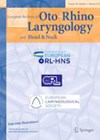
Journal Reviews
Hyaluronic acid injection laryngoplasty
This systematic review discusses the use of hyaluronic acid in injection laryngoplasties. Unilateral vocal cord paralysis leads to incomplete vocal fold adduction and dysphonia. For patients not improving with voice therapy, surgical procedures include injection laryngoplasty or open laryngeal framework...
Can diet alone be used to treat laryngopharyngeal reflux?
In this crossover observational study, a low-fat, low-quick-release sugar, high-protein, alkaline, and plant-based diet was investigated as a single treatment for laryngopharyngeal reflux (LPR). Authors recruited 50 participants with demonstrated LPR on hypopharyngeal-oesophageal multichannel intraluminal impedance-pH-monitoring (HEMII-pH), off acid suppressive...
Using autologous blood to reduce postoperative infections
The removal of impacted wisdom teeth is a common surgical procedure with possible complications including postoperative bleeding and wound infection and alveolar osteitis. Preventing osteitis is dependent on retaining the blood clot in the socket with no infection. There are...
Does Tranexamic acid reduce intraoperative bleeding during FESS?
Intraoperative bleeding during FESS can reduce visibility and obscure important landmarks. This can result in longer operative times, increase risks of complications and even lead to incomplete surgery. Tranexamic acid is a drug which prevents fibrinolysis and stabilises blood clots....
Tranexamic acid and blood loss in bimaxillary surgery
This is a randomised double-blind placebo-controlled trial from Thailand to clarify the most effective dose of Tranexamic acid in reducing blood loss during a bimaxillary osteotomy. They confirmed that the dose of 10mg per kg is the most efficacious and...










